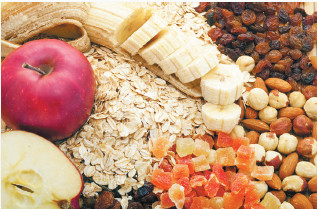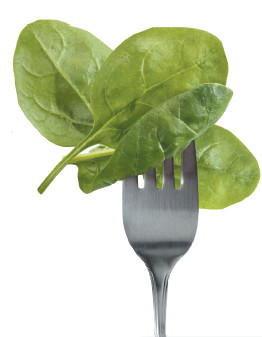
Wildfires: How to cope when smoke affects air quality and health

What can magnesium do for you and how much do you need?

Dry socket: Preventing and treating a painful condition that can occur after tooth extraction

What happens during sleep �� and how to improve it

How is metastatic prostate cancer detected and treated in men over 70?

Could biofeedback help your migraines?

What is autism spectrum disorder?

Plantar warts: Options for treating this common foot condition

Cancer survivorship: What comes next after treatment

Nutritional yeast: Does this savory, vegan seasoning pack a nutritional punch?
Nutrition Archive
Articles
Stop the carb confusion
Some carbohydrates are healthier than others, and eating too many processed carbs can harm your health.
Carbohydrates—or "carbs" for short—play a starring role in many healthy diets. For example, carb-rich whole grains, fruits, and vegetables are at the core of the heart-healthy Mediterranean and DASH diets.
Snacks: Quality vs. frequency
When it comes to snacking, is what you eat more important than how often you snack? A study published in the July 2015 Journal of the Academy of Nutrition and Dietetics tracked the snacking habits and foods of more than 200 people (average age 42). After two-and-a-half years, researchers observed that people who snacked on fruits and vegetables had, on average, a lower body mass index (BMI) than people who snacked on desserts and sweets. BMI is a measure of body fat based on a person's height and weight. Calories, frequency of snacking, and the time of day snacks were eaten didn't seem to affect BMI.
The study didn't show that the quality of snacks people ate was responsible for the lower BMI. However, researchers say the findings support the idea that wise snack choices can contribute to a healthy diet, and that snacking isn't necessarily unhealthy unless you choose empty calories such as chips, desserts, and sugar-sweetened drinks. Kathy McManus, director of the Department of Nutrition at Harvard-affiliated Brigham and Women's Hospital, underscores the importance of that approach: "Timing or frequency is not as important, as long as healthy snacks are selected." She recommends nuts such as almonds, peanuts, pistachios, or hazelnuts; hummus with baby carrots; peanut butter with celery or an apple; part-skim string cheese with a small bunch of grapes; or plain nonfat Greek yogurt with blueberries.
The official ousting of artificial trans fats
The FDA is giving companies until 2018 to either stop using partially hydrogenated oils in foods or file for an FDA okay to keep using them.
Protein sources that are best for your heart
Fiber-rich and low in fat, beans are one of the best sources of heart-healthy protein. |
The types of fat and other nutrients found in plant- and animal-based protein foods should guide your choices.
Higher blood levels of unsaturated fats linked to longer life
Image: Thinkstock |
A diet rich in polyunsaturated fats—found mainly in vegetable oils and fish—seems to protect people against cardio-vascular disease. A new study that measured blood levels of these fats in older adults now lends further support to this observation.
The report, in the June 17, 2015, Circulation, included more than 4,200 Swedish men and women without heart disease who were 60 years old when they joined the study. Researchers then tracked the participants' deaths over the following decade and a half. People with the highest blood levels of these beneficial fats were less likely to die from heart disease or any other cause than those with the lowest levels. Measuring the blood levels of these fats may be more reliable than asking people to recall what they ate, the researchers note.
Mediterranean diet: Good for your mind and your heart
Plant-based compounds known as polyphenols are plentiful in the Mediterranean diet, which may explain its health benefits. |
Extra-virgin olive oil and nuts seem to contribute to the benefits.
Can you eat your way to brain health?
A heart-healthy lifestyle is strongly associated with better memory and lower risk of Alzheimer's disease.
The health press is full of claims that "superfoods"—like fresh berries and leafy greens—can keep your memory sharp and hold the threat of Alzheimer's disease at bay. But for now, the evidence is preliminary at best. Your safest bet is to lead an overall heart-healthy lifestyle—including eating a plant-based diet and getting regular exercise—rather than drawing up a shopping list of alleged brain-boosting superfoods.
How to sneak in more dietary fiber
A fiber-rich diet includes a variety of fruits, vegetables, and whole grains. Image: Thinkstock |
Meeting fiber goals improves overall nutrition and helps with regularity, even without dramatic dietary changes.
Add more nutrient-dense foods to your diet
Foods such as kale, cantaloupe, and quinoa can boost the amount of nutrients you consume without increasing calories.
Getting enough nutrients through diet is challenging as we age. Our bodies don't absorb nutrients as well as they once did, yet we tend to need fewer calories and eat less. So it's important to make the most out of the foods we do eat. One way is by choosing more nutrient-dense foods, which provide more nutrition bang for the calorie buck. "They contain an abundance of nutrients and other healthful substances—vitamins and minerals, fiber, lean protein, and unsaturated fats—but are not excessive in calories. This is compared with foods of low nutrient density that are high in calories," says Liz Moore, a registered dietitian at Harvard-affiliated Beth Israel Deaconess Medical Center.
Sugary drinks may raise levels of harmful blood fats
Drinking sodas and other beverages sweetened with high-fructose corn syrup may boost levels of harmful LDL cholesterol and triglycerides in your blood, according to a study in the June 2015 American Journal of Clinical Nutrition.
Researchers assigned 85 healthy adults to four different groups. One group drank beverages containing the artificial sweetener aspartame, while the others drank beverages sweetened with various percentages (10%, 17.5%, and 25%) of high-fructose corn syrup. After two weeks, LDL cholesterol levels held steady in people who drank aspartame-sweetened drinks. But among those who drank beverages with high-fructose corn syrup, LDL cholesterol rose in tandem with the percentage of sweetener.

Wildfires: How to cope when smoke affects air quality and health

What can magnesium do for you and how much do you need?

Dry socket: Preventing and treating a painful condition that can occur after tooth extraction

What happens during sleep �� and how to improve it

How is metastatic prostate cancer detected and treated in men over 70?

Could biofeedback help your migraines?

What is autism spectrum disorder?

Plantar warts: Options for treating this common foot condition

Cancer survivorship: What comes next after treatment

Nutritional yeast: Does this savory, vegan seasoning pack a nutritional punch?
Free Healthbeat Signup
Get the latest in health news delivered to your inbox!
Sign Up











